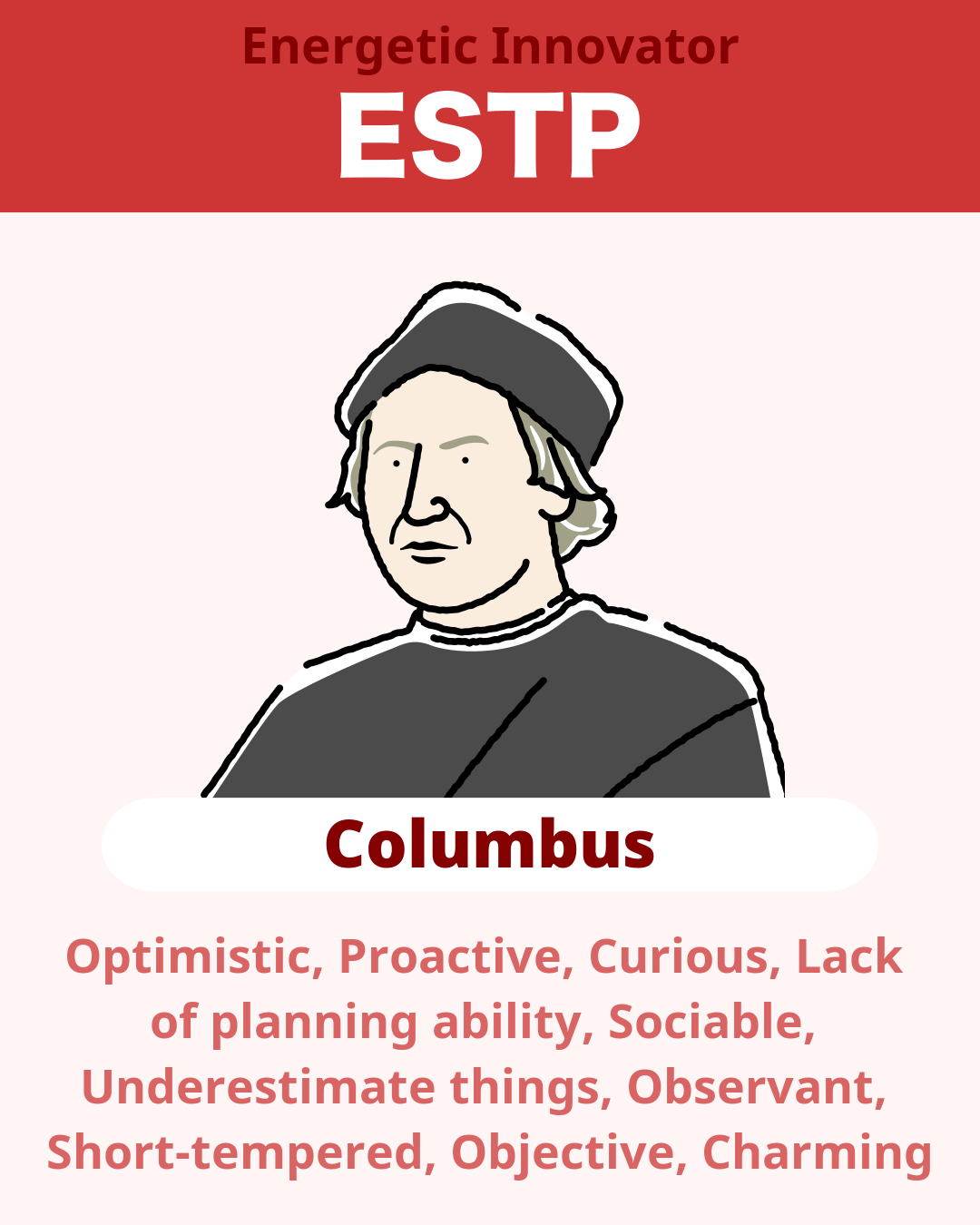
People with the ESTP personality type, also known as the Entrepreneur personality type, are diplomatic and good at dealing with people. They are bold and proactive in searching for fun things to do. They are not afraid of being alone, but they also enjoy the company of friends and acquaintances, even if it is just making small talk. ESTPs are usually thought of as friendly and approachable by those around them. They are multitalented and are good at livening up the place. Another characteristic of ESTPs is that they are pragmatic and tend value numbers and objective evidence. Although they have a logical side to them, ESTPs are not rigid and can be flexible in their thinking. They are also characterized by their unwillingness to do anything wasteful and their preference to act in a rational manner.





| Ranks | Types | % | |
|---|---|---|---|
| 1 | INFP | Vincent van Gogh | 13% |
| 2 | ENFP | Anne Frank | 11% |
| 3 | ISFP | Mozart | 8% |
| 4 | INTP | Albert Einstein | 8% |
| 5 | INFJ | Nightingale | 8% |
| 6 | ESFJ | Andrew Carnegie | 7% |
| 7 | ISFJ | Mother Teresa | 7% |
| 8 | ESFP | Marie Antoinette | 6% |
| 9 | ENTP | Thomas Edison | 6% |
| 10 | ENFJ | Joan of Arc | 5% |
| 11 | ISTJ | Sigmund Freud | 4% |
| 12 | ISTP | Spartacus | 4% |
| 13 | INTJ | Leonardo da Vinci | 4% |
| 14 | ESTJ | George Washington | 3% |
| 15 | ESTP | Columbus★ | 3% |
| 16 | ENTJ | Napoleon | 3% |
If you've ever wondered what else besides your genes and immediate environment has shaped your personality, you may have taken a personality test. If a test tells you that you have the ESTP personality type, you might want to learn more about it to understand this unique personality better.
If you just want to know more about this personality type, you can stop searching here. This article tells you everything you could want to know about ESTP personality type. So, let's start at the start. Even though the 16-personality test isn't backed by science, it became very popular by the end of the 20th century.
This way of putting people into groups based on their personalities is used by many companies and the US government when they hire people. Katharine Briggs, who came up with the 16 personalities theory, began to study Carl Jung's personality types once her daughter Isabel went to college and had what is called "empty nest" syndrome.
Briggs was so interested in Jung's findings that she asked him what words like "Intuitive" and "Thinking," which we now use to describe dominant preferences, meant. Soon, she and her daughter decided to devise a way to group people based on their personalities. This is how the 16 personalities test got started.
The ESTP personality type is the 16 types in the Myers-Briggs Type Indicator. It stands for Extroverted, Sensing, Thinking, and Perceiving. People with this personality type tend to care more about the present than the future. They could also be friendly, start things, and participate in events. People might call the ESTP personality type "the entrepreneur."
If you're questioning what the letters ESTP stand for, we're here to inform you that they support a person's four most crucial importance. Here is a detailed explanation of what an ESTP likes.
Extroverted people get their energy and sense of worth from the outside world rather than the inside. People also think extroverts find the stability they need in the outside world and use it to balance their chaotic inner lives.
ESTPs are typical extroverts who like to be in the spotlight by flirting and telling jokes. They are always looking for action and enthusiasm because they like getting a rush of adrenaline. ESTPs are always on the go, full of energy, and able to get past problems.
This choice concerns the source from which someone gets their information and ideas. The Sensing types use their senses to figure out what's going on around them. Because of this, they are realistic and based on facts and real-life experiences. ESTPs can quickly gather information to develop immediate, useful solutions to any problem.
Because of this preference, ESTPs find beauty in everything and use it to create their style. They also pay close attention to what people say and do with their bodies and faces. This amazing "power" helps ESTPs guess what someone will do and how they will feel and act accordingly.
The way a person makes decisions is what is meant by their "thinking preference." This means that people with this preference make decisions based on facts, not how they feel. So they won't have endless intellectual discussions about abstract ideas concerning possible future events. On the other hand, ESTPs are happy to participate in a productive conversation that will lead to results soon.
Also, how an ESTP deals with feelings depends on their Thinking preference. As we've already said, they may have trouble understanding what emotions mean, which often comes from how they talk. They tend to be viciously honest and blunt, not caring about how things make other people feel. Many people may find this way of talking rude and hurtful.
Perceiving preference has to do with how different people approach different tasks in life. Since ESTPs are flexible and enjoy their freedom a lot, it is unlikely that they will agree to set schedules. They would rather work independently than follow orders from someone in charge.
Still, ESTPs who are hard to stop can show their leadership and problem-solving skills in fast-paced work environments. Even though there are many good things about being flexible, there is also a bad side. Specifically, ESTPs have trouble staying on task when doing boring or repetitive tasks. Because of this, they may easily drop their current projects to try something new and exciting.
Now that we've discussed the ESTPs' likes, dislikes, and thoughts, let's look at some of their typical personality traits. This section may be the best place to find out how to recognize an ESTP. This will allow individuals to comprehend the ESTP personality type better.
ESTPs are known for having a can-do attitude and a lot of energy that never runs out. Once they find a fun challenge, they will do everything they can to take it on and encourage others to join them and do their best to get through hard times.
They are brave and tough. ESTPs will do whatever it takes to get what they want, using their intelligence, physical traits, and drive.
ESTPs are friendly and good at talking to people, so they can quickly become the center of any group. People like being with them because they do things on the spot and have a great sense of humor.
ESTPs are very observant, which lets them "read" the body language of others to figure out how they will act.
People will always be aware of their position with an ESTP because they are honest and tell it like it is. Many people will respect ESTPs for the way they talk and see this as a strength instead of a weakness.
People with the ESTP personality type are often critical. This is a problem because they can "read" other people. ESTPs will judge people based on this first impression. Because of this, they might miss the chance to meet someone or build a strong relationship with them based on their first impression.
When the ESTPs think that someone doesn't follow their lead and doesn't share their drive and efficiency to reach goals, they may become impatient and rude.
They don't have a plan for their lives. They like being free and not having to stick to strict schedules. They might find the second one annoying and limiting.
ESTPs are easily distracted and lose interest in tasks and endeavors quickly. When this happens, they usually stop working on what they started and move on to something else.
ESTPs have several values that make them good leaders. They want their work to be objective, so they avoid suggestions and points of view they can't measure. In the same way, they like to work as much as possible with facts, data, and statistics to get good results. ESTPs also like to be in charge and respect the leaders in their field. They like to lead, so most of the time, they like to be in charge.
Because they like to pay attention to current events, ESTPs tend to work for immediate payoffs. They don't want to wait weeks or months to see the results of their work. Instead, they want to see the results right away. For instance, an ESTP might like being a landscape architect because they can see the results of their work right away.
They are also often inspired by the compliments and focus they get from other people. They work hard to get results that their coworkers or managers will notice. They might feel good about themselves if they were recognized at a team meeting, won employee of the month, or were promoted to a high-profile job.
An ESTP likes talking to others, which helps them build strong relationships with the people they work with and hang out with. Often, an ESTP's job is just another place for them to meet new people and feed their outgoing nature. Because of this, a work environment based on teams is most appealing. These may be their preferences at work:
They like to be in charge or in charge of other people. Even leading a small team can be enough for them. Most of the time, they would rather develop new ideas and make their own rules than follow others. ESTPs try to collaborate with other individuals when they can. Most of the time, they work effectively in a team with different types of professionals with whom they can talk. ESTPs can usually get along with a wide range of people.
ESTPs like to work best when they don't feel they have to follow too many rules or are being managed too closely. They also like to work where they can move around and be busy. If an ESTP doesn't want to work in an office, they could work outside, like in building projects or landscaping. ESTPs also do well when they're stressed and can act quickly in an emergency. Since they concentrate on short-term goals, they can deal with situations that move quickly and have tight deadlines.
Most ESTPs are good at keeping in touch with various professionals. They obtain along well with other people and like to talk with everyone. Most of the time, ESTPs have a lot of superficial relationships instead of a few deep ones. This can help them build a large professional network, which can help them do well in their jobs. ESTPs can easily gain the trust and confidence of others because of how convincing and interesting they are when they talk.
If you don't have this personality, you probably have friends, family, or coworkers who do. When you look at outgoing people the next time, don't put them all in the same box. Instead, take a closer look and determine if the person is an ESTP, an ESTJ, or some other type. Check the Myers-Briggs Type Indicator to find out what kind of person you are.
Even though ESTPs and ESTJs have some things in common, they are also very different. By knowing what makes people different, you can get along better with people different from you. Instead of thinking everyone is the same, you can learn about the different parts of our personalities and how we see the world.